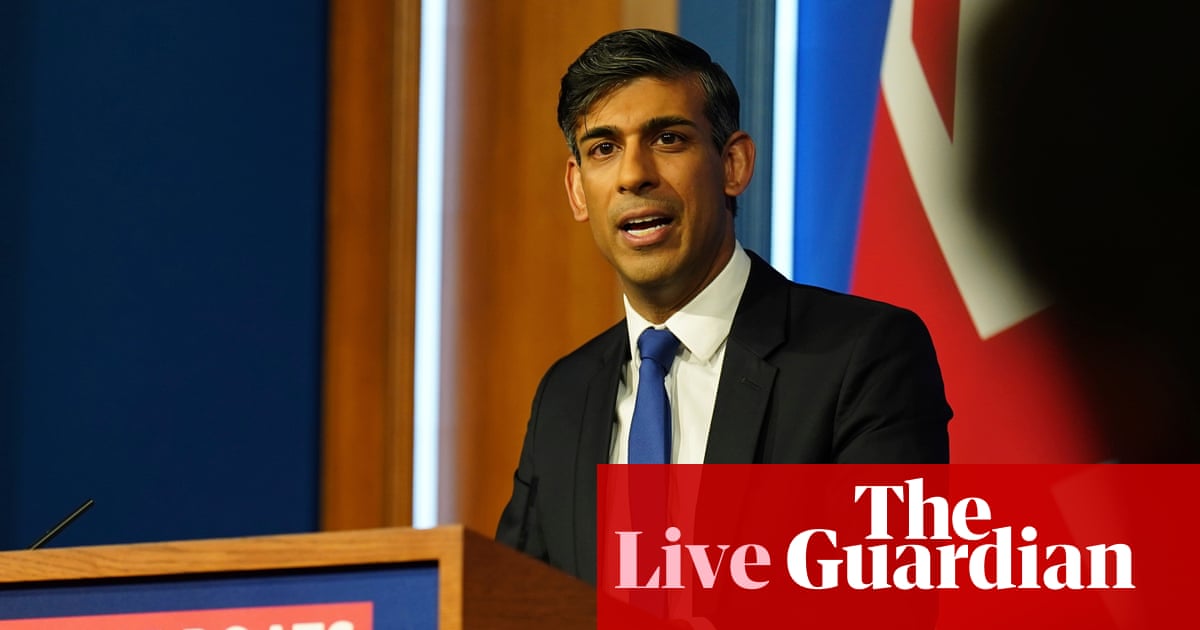
Starmer challenges Sunak to force Nadine Dorries out of Commons – as Tory website explains how it could happen
In his LBC interview Keir Starmer challenged Rishi Sunak to force Nadine Dorries out of the House of Commons because she has said she wants to resign anyway and she appears to have given up doing any work in her capacity as an MP. (See 12.13pm.)
When asked about this, No 10 has always said that this is a matter for parliament, not the government, and the conventional view is that removing an MP in these circumstances is extremely difficult. A recall election can only be held if an inquiry concludes that an MP has committed a serious breach of the rules, and in the Dorries case Daniel Greenberg, the parliamentary commissioner for standards, has indicated that he does not think an inquiry is justified.
But a good article has been published today making the point that the Commons could just bypass the parliamentary standards machinery and vote for a motion saying Dorries should be expelled. Significantly, the article appears not in the Guardian, or in another leftish paper, but on ConservativeHome, the website for Tory members. And it has been written by Henry Hill, the ConHome deputy editor.
Hill says that if MPs were to vote on a motion like this, it would probably pass, and he suggests there might even be some advantages from such a vote for Rishi Sunak. “There would be worse ways to restore his credibility as a new broom after the debacle of Boris Johnson’s resignation honours,” Hill writes.
In truth, Sunak is unlikely to see things this way, not least because Dorries is a Daily Mail columnist (one job she is actually doing) and the chances of No 10 declaring war on someone on Paul Dacre’s payroll are close to nil. But Hill argues that a vote of this kind could be good for the Commons. He says:
In the course of decades of reforms, the Commons has never divested itself of the power to expel, nor (that I know of) has it been seriously proposed that it do so. There thus seems to be little dispute that this is a power the House ought to have – and thus, by extension, to use on occasion.
Moreover, inactivity sets its own precedent, and the availability of expulsion makes the failure to do so a choice. How hollow will all the condemnation of Dorries ring, from all sides, should the electorate ever realise that the politicians have to hand a simple means to remedy the problem – but are choosing not to use it?
Afternoon summary
Keir Starmer has claimed that he would not be able to afford to go to university if he were a teenager today because of government policies. (See 9.34am.) The education secretary, Gillian Keegan, said that Starmer was wrong, and that more and more people from disadvantaged backgrounds are going to university. (See 10.26am.) But a snap YouGov poll suggests that 60% of people agree with Starmer that, if they wanted to go to university today, it would be too expensive. (See 4.44pm.)
Starmer has challenged Rishi Sunak to act to force Nadine Dorries out of parliament. He made the comment as ConservativeHome, the leading website for Tory members, published an article suggesting that MPs should get rid of Dorries by voting on a motion to expel her. (See 12.40pm.)
Scotland’s drug deaths remain almost three times higher than for the UK as a whole, despite the country recording its largest fall in fatalities last year, as campaigners warn of the emerging threat of synthetic opioids prompted by Taliban disruption of the global drugs trade.
Jeremy Hunt has played down the prospect of pre-election tax cuts despite news that the public finances are in less bad shape than the government’s spending watchdog forecast in the spring budget.
George Eustice, the former environment secretary, has been told to ask permission from the post-government jobs watchdog every time his new consultancy firm takes on a client to avoid giving them unfair access to his former department.
Government"s £1m investment welcomed as "transformational for English chess"
The Department for Culture, Media and Sport has announced a £1m package of measures to promote chess in schools, particularly in disadvantaged areas. In its news release it says:
The package will support primary school children attending schools in disadvantaged areas across England to learn and play chess, improve the visibility and availability of chess in communities, as well as fund elite playing as part of a combined package worth almost £1 million.
The Department for Culture, Media and Sport will invest £500,000 in the English Chess Federation (ECF) over two years, in order to develop the next generation of world-class talent. Funds will support expert coaching, training camps and cutting-edge computer analysis for international events to assist current grandmasters and up-and-coming players.
Malcolm Pein, the English Chess Federation’s director of international chess, claimed the investment would be “transformational for English chess”.
To mark the announcement, No 10 has posted a picture of Rishi Sunak hosting young chess champions at Downing Street on its flickr account.
60% of Britons agree with Starmer that cost of going to university has become prohibitive, poll suggests
According to a snap YouGov poll, 60% of Britons believe, as Keir Starmer says he does, that if they were young today they would not be able to afford to go to university.
Starmer may regard this as vindication of what he was saying, regardless of quibbles from ministers (see 10.26am) and obscure bloggers (9.34am).
Andy Burnham calls for party whipping system to be abolished, saying it treats MPs like kids
In a report for the Herald, Tom Gordon has a fuller version of what Andy Burnham, the Labour mayor of Greater Manchester, said at the Edinburgh Festival Fringe today about why he would abolish the whipping system at Westminster. (See 3.28pm.)
Burnham said that having party whips (who tell MPs how they must vote in more or less every division, with backbenchers at risk of being suspended, or ultimately barred from being a candidate in the future) meant MPs were being treated like children. He said the system put too much power in the hands of advisers.
Burnham explained:
You know what I would do? I would remove the whips system from the Commons …
We should have a system in politics where the status of elected representatives is higher, not that they’re just told how to vote like a school kid.
It’s a case of, use your best judgment for your place. And politics would be held in better esteem, I think, if it was organised in that way.
The whips system, the effect of it, is to take power off elected representatives, and concentrate it in the hands of the unelected advisers and civil servants, 50 or 100 or so at the heart of government.
According to the Herald report, Burnham also said that he had become a “very strong” supporter of proportional representation. He backed it with “the zeal of the convert”, he said.
Whips are often near the top of lists of what’s wrong with Westminster. As well as being blamed for preventing MPs from being able to vote on the basis of what they actually think, they are often accused of being willing to use skulduggery and blackmail to enforce discipline. There is some truth in this – although probably less than in the past.
However, most political scientists tend to take the view that whips are a necessary evil in a parliamentary democracy. Without whipping, a party leader with a majority might find it hard, or even impossible, to implement the policy programme set out in an election manifesto.
Watchdog gives George Eustice strict rules for new consultancy firm
George Eustice, the former environment secretary, has been told to ask permission from the post-government jobs watchdog every time his new consultancy firm takes on a client to avoid giving them unfair access to his former department, Pippa Crerar reports.
Henry Hill, the ConservativeHome deputy editor who has published an article today suggesting that MPs should vote on a motion saying Nadine Dorries should be expelled from the Commons (see 12.40am), says that if Keir Starmer thinks she should go, Labour should table an expulsion motion itself.
Labour is allocated 17 days every session of parliament when it can choose the motion to be debated, but it is for the government to decide which actual days it gets.
Andy Burnham, the Labour mayor of Greater Manchester, has said that he would not rule out standing again for the Labour leadership at some point in the future.
He made the point in an event at the Edinburgh Festival Fringe where he was taking part in a Q&A with the former Labour MSP Neil Findlay.
Burnham has stood for the Labour leadership twice before, in 2010 and 2015. In the early days of Keir Starmer’s leadership, when Starmer was struggling to make an impression and Burnham was receiving praise for his battles with No 10 over Covid policy, he was seen as well positioned for a Westminster comeback. But speculation about the future Labour leadership has now largely ceased because Starmer’s position has become so secure.
Asked if he would consider another run for the leadership, Burnham said the circumstances would have to be right.
He said he hoped there would be a Labour government after the next election, with Starmer bringing hope and “radical change” to the way Britain is run. Burnham went on:
If a path opens up in time then, of course, I’m not going to turn away from that.
I think there potentially is one last go at Westminster somewhere. But I want to be clear about this – I would only be going back to enact what I’ve talked about today.
Burnham was referring to what he said during the Q&A about the importance of politics not being centralised. “This mentality, that Westminster is the only show in town and we have to rush back there, is actually what’s wrong,” he said.
During the Q&A Burnham also:
Predicted that the next election would probably be “the most unpleasant, divisive general election that we will have seen in our lifetimes”;
Complained that most of his contact with the Labour leadership now come through “reading briefings about me in the newspapers”;
Said Labour “needs to show how it can bring hope”;
And suggested he would like to see the party whipping system at Westminster dropped.
Humza Yousaf, Scotland’s first minister, has been tweeting about the latest drug death figures for Scotland.
He says the figures are still too high.
Every life lost to drugs is a human tragedy. While deaths in 2022 are down 21%, too many families are still losing loved ones. @ScotGov is taking forward our £250m National Mission to reduce deaths. We will continue to take a public health approach to tackling drug deaths.
And he has restated the Scottish government’s call for the decriminalisation of drugs for personal use.
@ScotGov’s Drug Law Reform paper proposes an evidence-based drugs policy, with problematic drug use treated as a health, not criminal matter. Such proposals could support ongoing work to reduce drug deaths. Where powers are reserved, we are ready to work with the UK Government.
Decriminalisation would have to be decided by Westminster, not Holyrood, because drug laws are a reserved matter under the devolution settlement, and the UK government has rejected the proposal.
Is Starmer right to say he could not afford to go to university if he were young today?
In a statement released overnight Keir Starmer said if he were a young person today, he would not be able to afford to go to university. In my opening post, I argued that this was probably not true. No one can say for sure – it’s a hypothetical – but the proportion of young people going to university has risen considerably since Starmer was a student in the 1980s, there is compelling evidence to show that poorer students are not being deterred by tuition fees and Starmer’s background implies he is the sort of person who would be going. (See 9.34am.)
But many of you don’t agree, and in your comments you have highlighted points I overlooked. Here are some of your responses.
Many of you made the point that living costs, and not necessarily, tuition fees, are the obstacle.
One said:
I think Starmer’s claim has a lot of truth. As a parent of two children nearing university age, I think he has a very good point – the problem is the living cost, especially rents for university as the amount that can be loaned for living costs doesn’t cover the costs ( it hasn’t been increased in line with cost of living) so relies on parents having some money spare.
Another said:
I’d regard myself as an ‘aspirational parent’ but with accommodation prices out of control and 40-year loans, my son has decided to try his luck in the workplace in the hope that Labour may make it easier to go to university. I can barely afford my own rent in Manchester, let alone the obscene £800 a month the University of Birmingham charge for an en-suite room.
AverageBod said:
If I was faced with the cost of university today, I am not sure I could go. I am in the lucky position of being able to cover the shortfall for my children, but my parents could not have done that for me. The cost of rent is barely covered, leaving virtually nothing for anything else.
And plastic666 asked:
Where in the UK is it possible to get accommodation of the legally decent standard which is less than the available loans and grant provided to the students from the poorest backgrounds?
Another point is that, even if more people are going to university now, their university experience is not the same as it was for people like Starmer in the 1980s.
One reader said:
While you are right to say that large numbers of working-class/less wealthy students have not been turned off university by tuition fees, their university experience has completely changed.
Many/most of my students now have to work full-time hours in retail jobs to be able to afford university accommodation, food and bills. They are rarely getting the full university experience of the extracurricular activities, like participating in societies, clubs, and career-orientated social events that provide the extra social and cultural capital that enables them to enter professions like the law.
And several people argued that, even if teenagers are not being deterred from going to university, the situation has got much harder for mature students.
KateKingWarwickshire said:
Starmer is right, of course. I’ve mentioned it before, but I left school at 16 with no exams, and went out to work straight away as a typist. In my thirties I got day release to do O and A levels, no money required by me, got a load of straight A’s, applied to Oxford, sat an entrance exam for the college I applied to, and got one of the last grants Warwickshire was handing out, and went up to Oxford as a mature student. That was in 1990! Universities may have *some* bursaries, and there may be *some* help for poorer students. But that chance I had would never be available now.
Onunglown said:
I was at uni in the late 60s I could count on the fingers of one hand those who did not receive a full grant. Later in life, in the 80s, I studied part-time, but by attending law [school] and got a second degree. Had to pay £200 a year fees for second degree but still hugely subsidised. Then went to Leeds Poly for solicitors finals course [on a] full grant. At that time was married with 2 children. Today that would not happen.
And another reader said:
It is probably true that Starmer would still be going to uni if he were 18 today, but that isn’t the same for everyone. Education today is a far more hostile environment then it was during my parents’ era.
For starters adult education doesn’t exist and with the obliteration of BTEC and other level 3 qualifications there is now an age barrier to education. In my area colleges state that over-20s can’t do A levels. Also, for students who don’t get their GCSEs first time, there are no colleges that do five GCSEs, meaning there is no ladder of progression.
Before the T level introduction there was a route in doing BTEC level 2s but these are also becoming difficult because of the pre-T level introduction. Anyone over the age of 19 is automatically denied from T levels as it is stated that they are 16-18.
Finally, at least one reader, VladTheImpartial, has accused Starmer of discouraging young people from going to university. He said:
Starmer’s comments are not helpful for working-class kids anxious about student debt. As Martin Lewis always emphasises, student loans are not pure debt, but rather a small additional tax burden only incurred once the graduate is in reasonably paid employment (more chance of that with a degree). Starmer’s rhetoric is irresponsible and disingenuous.
The precarious fiscal prospects of young people generally are a separate and pressing concern.
Momentum, the leftwing Labour group, says that Keir Starmer has the right analysis about the problem with student funding, but the wrong solution. A spokesperson said:
Once again, Keir Starmer has the diagnosis right, but his solution fails to impress.
University is indeed unaffordable under the Tories, with students saddled by debt and sky-high rents. The answer, as Keir Starmer himself previously recognised, is to end the failed market model of higher education, abolish tuition fees and restore maintenance grants. Warm words won’t solve the crisis facing students and universities.
The opposition parties in Scotland are not inclined to give the SNP government much credit for the 21% year-on-year fall in drug deaths. (See 9.49am.)
This is from Douglas Ross, the Scottish Conservative leader.
While these latest numbers indicate some progress is being made from an utterly catastrophic base, Scotland’s appalling fatality rate means we remain the drugs-death capital of Europe by an enormous and alarming distance.
SNP ministers have a duty to explain why, in Nicola Sturgeon’s words, they took their eye off the ball as this national emergency spiralled out of control and cut money from drug treatment programmes.
And this is from Jackie Baillie, Scottish Labour’s health spokesperson.
The fact that we are still seeing such shockingly high levels of drug deaths in Scotland is a national tragedy.
That progress is being made is welcome, but for many it will be too little too late.
In 2019, the SNP declared this a public health emergency but much of what has been done is simply unpicking the damage of years of SNP cuts to drug and alcohol treatment. With drugs deaths in Scotland nearly three times higher than in the rest of the UK, there can be no delay in acting to protect lives.
In relation to today’s small boat arrival numbers (see 10.47am and 11.26am), some readers have said we should report how many refugees are arriving through other routes to provide context.
Equivalent day by day figures are not available. But it is the case that, in 2022, more than half the people who claimed asylum in the UK did not arrive by small boat. I covered this, and how asylum applicants only comprise a small proportion of the overall annual immigration cohort, in a post on the blog earlier this month.
Starmer challenges Sunak to force Nadine Dorries out of Commons – as Tory website explains how it could happen
In his LBC interview Keir Starmer challenged Rishi Sunak to force Nadine Dorries out of the House of Commons because she has said she wants to resign anyway and she appears to have given up doing any work in her capacity as an MP. (See 12.13pm.)
When asked about this, No 10 has always said that this is a matter for parliament, not the government, and the conventional view is that removing an MP in these circumstances is extremely difficult. A recall election can only be held if an inquiry concludes that an MP has committed a serious breach of the rules, and in the Dorries case Daniel Greenberg, the parliamentary commissioner for standards, has indicated that he does not think an inquiry is justified.
But a good article has been published today making the point that the Commons could just bypass the parliamentary standards machinery and vote for a motion saying Dorries should be expelled. Significantly, the article appears not in the Guardian, or in another leftish paper, but on ConservativeHome, the website for Tory members. And it has been written by Henry Hill, the ConHome deputy editor.
Hill says that if MPs were to vote on a motion like this, it would probably pass, and he suggests there might even be some advantages from such a vote for Rishi Sunak. “There would be worse ways to restore his credibility as a new broom after the debacle of Boris Johnson’s resignation honours,” Hill writes.
In truth, Sunak is unlikely to see things this way, not least because Dorries is a Daily Mail columnist (one job she is actually doing) and the chances of No 10 declaring war on someone on Paul Dacre’s payroll are close to nil. But Hill argues that a vote of this kind could be good for the Commons. He says:
In the course of decades of reforms, the Commons has never divested itself of the power to expel, nor (that I know of) has it been seriously proposed that it do so. There thus seems to be little dispute that this is a power the House ought to have – and thus, by extension, to use on occasion.
Moreover, inactivity sets its own precedent, and the availability of expulsion makes the failure to do so a choice. How hollow will all the condemnation of Dorries ring, from all sides, should the electorate ever realise that the politicians have to hand a simple means to remedy the problem – but are choosing not to use it?
Starmer rejects claims changing law to force defendants to attend court for sentencing not practical
Here are the main points from Keir Starmer’s LBC interview with James O’Brien.
Starmer said Labour would reform student funding to make it “fairer” for students and “more effective” too. But he did not give details. The plans were still being developed, he said. (See 11.13am.)
He defended his claim that, if he were a teenager today, he would not be able to afford university. Rather than focus on tuition fees, he said the overall cost of living crisis was making life hard for students. And, to support his point, he said he had this morning met two young women who had decided to defer going to university for a year because they wanted to work for a year first to save money.
He said there was a “massive mis-match” now between government claims about the economy and what people are experiencing. He said:
There’s a massive mis-match now between what the government seems to be saying, things going reasonably well, and the lived experience of so many people in this country.
He challenged Rishi Sunak to “force the issue” and get Nadine Dorries to resign. He said she should go because she had not been representing her constituents “for a very, very long time”. He went on:
I would say to Rishi Sunak, ‘Get a grip of this. This is one of your MPs. Do something about it. Force the issue and get on with it.’
Starmer rejected legal claims that his call for a law to force defendants to attend their sentencing hearing in court is unrealistic, and just populist posturing. He was asked about a blog by the Secret Barrister making this case. (See 11.20am.) In response, Starmer did not address the practical objections to the idea; instead he just stressed how important it was for victims to see a defendant facing justice. He said:
I’ve got kids and many people listening have kids. I can’t even imagine the ordeal that [the families of Lucy Letby’s victims] have been through and to be denied the defendant actually facing justice at the final stage of sentencing hurts them deeply. And I therefore I don’t think it’s enough for politicians or lawyers to simply say, ‘I’m sorry, nothing can be done.’
When I was director of public prosecutions I met no end of people who told me, when we had a problem trying to improve victims’ rights, ‘Nothing can be done, don’t change it Keir it’s been in place a long time.’ In nearly every one of those cases we change things for the better here.
I’m not going to pretend it’s easy. But there are answers, there are options.
We said to the government back in April of last year, ‘Change the law, bring forward a proposal to ensure that defendants do face justice.’ We will look at the proposals and we’ll support them.
He also said, if the government did not act, Labour would try and force through legislation on this.
Starmer has just posted a message on Twitter on this point. He says:
My thoughts are with Olivia Pratt-Korbel’s loved ones on the anniversary of her death.
Olivia’s killer refused to appear in court for sentencing, denying her family the right to see justice done.
I support the Face the Family campaign led by her mum Cheryl to change the law.
More than 18,000 people have now crossed Channel in small boats this year, figures show
More than 18,000 people have arrived in the UK after crossing the Channel in small boats so far this year, PA Media reports. PA says:
Home Office data shows 661 people made the journey in 15 boats on Monday, the third highest daily total for 2023 to date. (See 10.46am.)
This takes the provisional total for the year so far to 18,618, according to PA news agency analysis of the government figures.
This is about 13% below the equivalent number at this point last year, when there had been more than 21,300 arrivals.
Last week 1,278 people made the journey, with crossings taking place on six out of seven days.
The highest daily total for 2023 so far was recorded on 10 August when 756 migrants made the crossing in 14 boats. The second highest number detected in a single day was 686 people in 13 boats on 7 July.
O’Brien asks Starmer about his call for the law to be tightened to ensure defendants have to attend sentencing hearing. He quotes a blog written by the Secret Barrister earlier this year (flagged up on this blog yesterday). The blog said that the proposal was unworkable and that responsible politicians should be explaining why to the public, “instead of appropriating bereaved families for their tubthumping tabloid pledges”.
Starmer defends his position. He says that it is important to act, and that he does not accept that reform is impossible.
But he does not get into the details of the objections raised by the Secret Barrister and others.
The interview is over. I will post the highlights shortly.












